]
Biographies
Muriel
Cooper 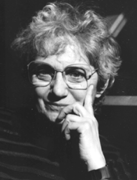
Muriel Cooper is Professor of Visual Studies and Director of the Visible
Language Workshop (VLW) at MIT. She is a professional designer, educator
and researcher whose commitment to computers and graphic design led to the
founding of the VLW in 1975 with Ron MacNeil (in 1985 the VLW became a member
of MIT's Media Laboratory). She received a B.F.A. Design/BS in Education
from Massachusetts College of Art and was a Fulbright Scholar in Milan,
Italy. Cooper has a broad base in all forms of visual communication and
her work has been acknowledged internationally in innumerable exhibits and
publications. Her design work in print includes over 500 books, over 100
of which have been awarded recognition in various competitions. The second
American Institute of Graphic Design Leadership Award was awarded to MIT
for the design excellence of the MIT Press, MIT Design Services and the
VLW all of which were founded and directed by Cooper. She has taught at
the Museum School of Fine Arts and has given presentations to a wide variety
of professional and educational groups at many institutions, including Cornell,
Yale, Rhode Island School of Design, Cooper-Hewitt. She coordinates the
overall plan for VLW research and education in intelligent graphics, which
investigates the intersections of visual communication, design research,
and artificial intelligence. Her own research concerns include how to design
how we share information; the organization of ideas as a requirement for
communication; and how the design process provides information required
for continuing interaction.
Nathan Felde 
Nathan Felde is the Director of the Media Laboratory for NYNEX Science and
Technology in Cambridge MA. He is the founder and former President of Lightspeed
Computers, Inc. and a founding partner of Implement, Ltd. Felde studied
music at Interlochen Arts Academy, Musikk Konservatoriet i Oslo, Norway
and the University of Louisville and has performed as violist in Europe
and throughout the United States. He obtained an M.S. from MIT, studied
design with Robert Doherty, and has poster designs in the collections of
the Museum of Modern Art, Library of Congress and the Smithsonian. He is
recipient of a New York Art Director's Gold Award, a Craft Fellowship in
handmade papermaking from the National Endowment for the Arts and has been
a Design Fellow at the International Design Conference in Aspen. His work
has appeared in Communication Arts, Print, and Graphis and his collaborative
work with Julius Friedman is published in the book "Public Works".
Felde has been a writer for Communications Arts magazine and a guest lecturer
at Rhode Island School of Design, University of Cincinnati College of Art
and Design, The School of Visual Arts and Cranbrook. He is currently developing
high-performance mixed-media network concepts that take advantage of optical
fiber, massively-parallel processors, and broadband switching technologies
in support of collaborative work sessions.
Adrian Gropper 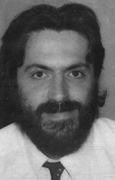
Adrian Gropper, M.D., is Founder and Principal of the AUTOCYT GROUP, Watertown,
MA, a cooperative that supplies a broad range of state-of-the-art instrumentation
engineering and product development services. Major collaborators represent
software, electronics, mechanical, industrial design, manufacturing, biochemistry
and strategic planning disciplines. Gropper is also a consultant to the LIMET project planning team at the Massachusetts
General Hospital, a project to provide interactive computer -generated images
to improve the safety and effectiveness of next-generation, less-invasive
surgical procedures. His undergraduate work at MIT included a BSci in Mechanical
Engineering, where he was awarded the Clapp-Poliack Award for Engineering
Excellence. He received his M.D. degree from the Harvard Medical School
in 1978. Gropper was Director of Biomedical Research for Orion Research
Inc. from 1979 to 1982. He was responsible for the conception and development
of the first low-cost physician's office electrolyte analyzer with interactive,
computer-assisted operation. The product won an IR-100 Award and the design
has since been cloned and marketed by at least three other manufacturers.
Following a year of research into computer enhancement of ultrasound images
and parallel processing architectures, Gropper and two partners founded
Analytix Inc. to develop advanced chemistry diagnostic technologies, and
he served as Vice President for Research and a Director of the company.
Gropper's current research interests include the research and development
of direct physician interfaces for advanced instrumentation, applications
of parallel computing architectures and neural networks to image transform
and sensor fusion problems, and the integration of rapid immunoassay technology
directly into the treatment protocol.
Walter Lee 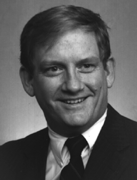
Walter Lee is President of Soliton, Inc., a Cambridge-based venture firm,
and since 1987 has been an essential collaborator in projects with Paul
Pangaro. He received his B.A. degree from the University of Virginia, where
he also pursued graduate studies (M.A. and ABD) in English Literature. He
then attended the University of Pittsburgh where he received his MBA in
1979. Lee's career has drawn upon his broad and deep understanding in many
disciplines, including simulation modeling, operations research, network
and game theory, statistics, economics, intelligent training and cognitive
psychology. Lee was Manager of the Corporate Planning and Development Staff
at Prime Computer, providing decision support to senior management in the
conceptualization, definition, and resolution of major business problems.
He subsequently joined the marketing organization at Prime as Manager of
Business Planning, where he was responsible for the formulation of plans
and strategies for major new product introductions and new ventures. In
1983 Lee joined Apollo Computer as Manager of Treasury Operations, where
he had full responsibility for the day-to-day management of the treasury
function in a company which grew from $17M to $215M in two years and added
twelve foreign subsidiaries. Lee joined Symbolics in 1985 as Assistant Treasurer,
with responsibility for the Treasury and Corporate Development functions.
Lee met Pangaro under the auspices of the Symbolics Investment Program in
1987 and in late 1987 founded Soliton to commercialize the products of software
research. He continues to pursue strong interests in cognitive science,
business modelling, and the relationship of entropy, economics, and networks.
Ed Levine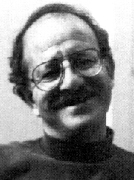
Ed Levine is Professor of Visual Arts and Director, Visual Arts Program
at MIT. He earned his B.A. from Yale University and his M.A. and PhD from
New York University. He has taught in universities and colleges throughout
the US. After holding the post of Chairman of the Art Department of Wright
State University in Dayton, Ohio from 1972 to 1978, he became Dean of Faculty
at Minneapolis College of Art and Design through to 1981. He was Dean of
the School of Art at East Carolina University from 1983 through 1989. His
professional career includes exhibitions of many site -specific sculptures
throughout the US and he has collaborated with architects on various projects.
His most recent works are a permanent installation for public use at the
Margaret Roethlisberger Memorial Park in Cambridge, and an installation
for the College of the Holy Cross in Worcester MA. Other exhibits have been
in Atlanta, various sites in North Carolina, and Minneapolis. He was a finalist
in the Plaza Design for City of Charlotte and the City Hall Public Sculpture,
Las Vegas. Levine has received numerous fellowships and grants from a variety
of sources including the National Endowment for the Arts (NEA), Bush Foundation,
and the North Carolina Arts Council. He has been the Chairman of the Visual
Arts Policy Panel for the NEA and consultant for public art to many organizations.
His articles and art criticism are many, appearing in publications such
as Artforum and Art Journal. His interests include the process of design
as a fundamental in human and organizational understanding; the question
of what art, architecture and visual design can contribute; and the role
of computation and visualization in design.
Michael Naimark 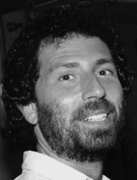
Michael Naimark, founder and principal of Naimark & Company, San Francisco,
is both an artist and researcher in the fields of virtual environments and
interactive arts. His firm is a Partner in the Telepresence Alliance, a
strategic consortium in the techniques and technologies of virtual reality
(VR), including visual display technology, three -dimensional audio technology,
system integration and "experience design". Naimark received a BSci in Cybernetic Systems University of Michigan and an M.S. Visual Studies
and Environmental Art at MIT. An expert on the genesis and evolution of
VR, he is the industry leader in surrogate travel and was instrumental in
making the first videodisc for a number of clients including Atari, ACM
SIGGRAPH, the National Geographic Society, Lucasfilm Learning, and the Apple
Multimedia Lab. Naimark's current clients include the Exploratorium and
the MIT Media Lab. His artwork has been exhibited at the San Francisco Museum
of Modern Art, the New York Avant Garde Festival, the Aspen Art Museum,
and the Kennedy Center for the Performing Arts, as well as in Paris and
Japan. He has held faculty appointments at the San Francisco Art Institute,
San Francisco State University, California Institute of the Arts, MIT, and
the University of Michigan. He is on the Editorial Board for "PRESENCE:
Teleoperators and Virtual Environments" published by MIT Press, the
first academic journal on VR. He has been a longtime member of the Society
for Visual Anthropology of the American Anthropological Association. His
interests center on an "environmental approach" to virtual environments,
in the sense of respectful documentation of "real" environments,
"a cinema verite approach to VR", which is driven by the
environment and not by the technology.
Paul Pangaro 
Paul Pangaro is founder and President of PANGARO Incorporated, Washington
DC. Pangaro holds a BSci in Humanities and Computer Science from MIT, and
a PhD in Cybernetics from Brunel University (England). He has worked in
the research laboratories of Jerry Lettvin, Nicholas Negroponte and Gordon
Pask. PANGARO Incorporated was founded in 1982 for the real-world application
of cybernetics. Long -term software development contracts have been performed
for the UK Admiralty Research Establishment (cognitive modelling and strategic
decision-making) and Niagara Mohawk Power Corporation (training for emergencies
in nuclear plants). This latter project was done in close collaboration
with Walter Lee, who contributes complementary skills in many areas in projects
with Pangaro. Throughout his career Pangaro has given many presentations
and demonstrations of his software to a wide variety of organizations, including
the American Society for Cybernetics, the Washington Philosophical Society,
the MIT Media Laboratory, the Harvard Graphics Conference, the Human Factors
Society, Conference on Computers in Education (Wales) and Machine Intelligence
in Defence (England). His articles have appeared in Data Training, Creative
Computing, AGFA's "26", and IEEE's Systems, Man and Cybernetics,
and his work has been reported in InfoWorld and Seybold Reports. He was
contributor to the television series FASTFORWARD as advisor and on-screen
presenter. Pangaro was Vice-Chairman of the Gordon Research Conference in
Cybernetics for 1988, and Associate Editor of Cybernetic Magazine, and he
has taught cybernetics at The George Washington University. Pangaro is currently
engaged in development of software for cooperative work, focusing on problems
of emerging language and shared goals.
- end -










